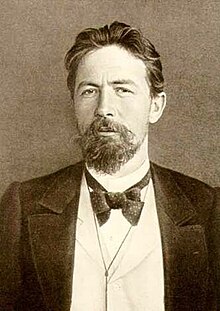On Easter Vigil (Chekhov)
In the Easter Vigil ( Russian Святою ночью , Swjatoiu notschju ) is a story by the Russian writer Anton Chekhov , which appeared on April 13, 1886 in the St. Petersburg daily Novoje wremja .
action
One night on Easter Sunday on the banks of the Goltwa : The first-person narrator has the ferryman on duty, the 35-year-old lay brother Jeronim, translate to the monastery. Jeronim mourns his friend, the tender, compassionate Nikolai. The day before, the hiero deacon - not even forty years old - had died during Mass in the middle of a Bible reading. With Nikolai, so Jernonim, the monastery has lost a very special songwriter. His akathists are not lacking in beauty and sweetness. By sweetness, Jeronim means that poetic brevity when Nikolai called God's son “light-giving lamp”, when he had caught lightning, wind and sun or when he sang about the lily of paradisiacal growth and the beautiful, leafy tree. Some monks would have laughed at the poet Nikolai during his lifetime and even condemned his Marian songs as a sin. Nikolai always preferred the quiet, gentle tones.
The narrator joins the excited crowd in the monastery church and regrets that Jeronim will not be replaced on the ferry. The lay brother wanted to experience the restless, joyful, interrupted singing.
On the way back over the Goltwa in the mist-shrouded dawn, the narrator observes Jeronim, who is still on duty, examining the face of a young businessman's wife. It seems as if the grieving lay brother sought those of the late songwriter in the woman's features; that lonely, misunderstood Nikolai, who added flower, star and sunbeam to his lyrics.
German-language editions
Output used:
- In the Easter Vigil , pp. 15-25 in Anton Chekhov: Happiness and other stories. Translated from the Russian by Alexander Eliasberg . 187 pages. Wilhelm Goldmann Verlag, Munich 1962, Goldmann's yellow paperbacks, vol. 868
Web links
- The text
- online in the Gutenberg-DE project
- Святою ночью (Чехов) (Russian)
- online in FEB (Russian)
- Chekhov Bibliography, Entry Stories No. 385 (Russian)
- Notice of first publication in the Labor der Fantastik (Russian)
- Entry in WorldCat
Individual evidence
- ↑ Russian Ijerodijakon
